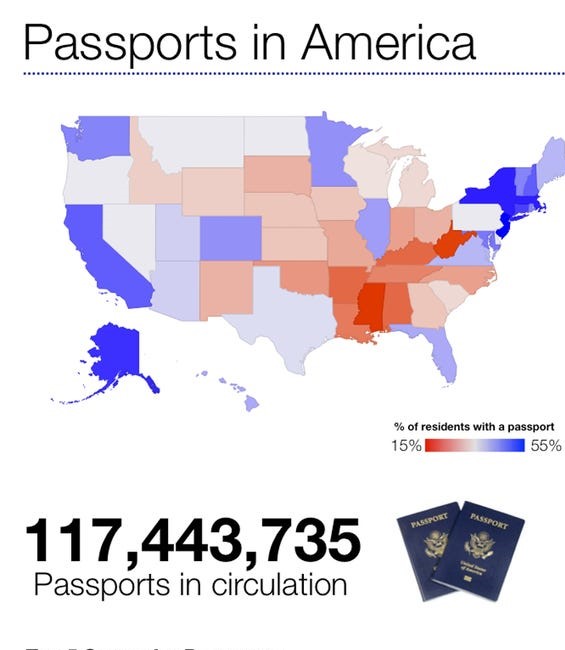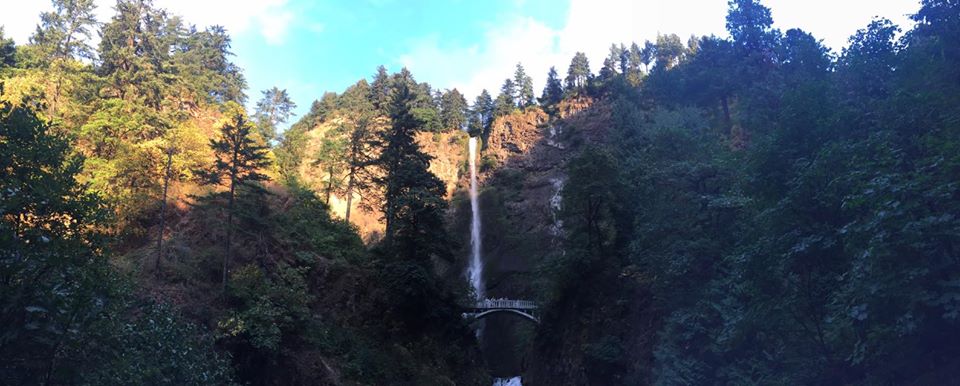
I have been traveling across the United States for as long as I can remember. The first trip of my memory was to Tulsa, OK, to visit my great-aunt and great-uncle, but that trip is very vague considering that it was done almost 24 years ago. I have traveled to California multiple times throughout my life; my first was to go to Disneyland when I was 12, and periodically over the course of ten years to visit my eldest brother and his family after he permanently settled there. I have been across Arizona visiting my aunt on my fathers side, but also to just travel through and take in the sites. I drove from Nebraska down to Houston, TX, to visit several friends, but also to experience the Houston Livestock Show and Rodeo and visit the Galleria Mall. The last and most recent trip I have taken was to Portland, OR. This trip was a gathering of the same group of friends I met in Houston, TX, to celebrate a friends birthday. We spent time at Multanomah Falls and drove out to Cannon Beach to experience the Pacific and a little microbrewery on the beach.

Huberman in the beginning of her article struggled to respond to the question, 'Why leave Maine?' Her response was simple, 'it will be a new way to see and do things. It will be good for me.' Huberman details her time spent in India with her sister; this country that boasts almost 1.06 billion people and growing, was crowded with livestock, scooters, animals, and vehicles, all dodging each other at the last possible moment. She speaks of a specific incident that was quite troubling to her at first, there were no dustbins to place her used water bottle and that India was 'one giant dustbin.' She then took in her surroundings to notice the heaps of garbage laden across the sides of the streets; in her own words, 'travelling was about liberation and freeing herself from backward, American ideas.' Huberman several months later would discover something she may have taken for granted in America, the fifth amendment. After the successful capture of the young man who had assaulted her, he was taken into a police station where he was mercilessly beaten to get out a confession to the crime.
Huberman spoke of the last country on her itinerary, China. Her details of this trip would highlight something she would never seen before and what appeared to be quite a popular attraction in China, 'Windows to the World'. These parks contained replicas of the most famous monuments from across the globe, Tower of Pisa, Giza Pyramids, the Sydney Opera House, Big Ben, and many others. It was here she claims the question 'Why leave Maine?' came up and her response changed how she viewed the question. Looking back on her friend Xiaos reaction to Hubermans feelings on the amusement parks, 'You Americans can go anywhere in the world, but us Chinese have only these parks. This is the most we will ever see in the world.' Those words, Huberman claims, resonated with her; traveling was not a way to see novel things, but to view things with new eyes: littering, death, right to remain silent, and the right to travel. Maine, you could look from the outside back in.
It teaches you about your homeland: often, I find myself taking things about home for granted, like driving, what I can wear, and how I am to speak. Traveling would allow myself to view the world from a new set of eyes when it comes to cultural variances and what makes my own culture unique. I will come home with a new appreciation for what I have.
It makes you more tolerant: even though I find myself to be incredibly tolerant of different cultures, I still have a part of me that struggles to grasp why other peoples from different cultures do what they do. For instance, why in America we fear death but in Latin cultures it is celebrated.
It makes you more confident and independent: my entire life I have let anxiety hold me back from leaving Nebraska, I am scared to travel alone, I have always needed to have a family member or close friend with me. I will say that my parents have caused some of this issue (my attempt to fly to England and travel for two weeks were dashed due to their concerns). I have always let things hold me back from my deepest desire to travel and explore. This is probably the most important of the three topics I have chosen for why I should travel.
Peterson encourages young people to travel as early as possible because the benefits are something that will follow you for your entire life; you are still searching to find the answers to who you are and deciding your career. She strongly encourages young people to travel because when you are studying in college the long breaks between semesters offers ample time to travel, taking advantage of your youth and freedom before it is gone to a career that takes up all your time.
Peterson lists off six reasons to travel abroad while still young: getting out of your comfort zone, build confidence, development of cultural sensitivity, adapting to globalization, immersion in a second or third language, and unlimited opportunities to network. One thing I have been able to think of that why young people should travel, is that it immerses you into a culture much different than your own and that the things we take for granted back home may not be allowed or given to others in other cultures. To be respectful of other places as you would expect of foreign travelers back home.
Author Natalie Avon describes a multitude of reasons why so few Americans travel abroad. Cultural and geographical diversity in the United States is quite spread out with mountains, beaches, deserts, and resort like cities. There is an entire continent, essentially, in which we can travel to experience something new. For instance, a Nebraskan like myself, can drive seven hours west and see the Rocky Mountains, or drive 14 hours south to Texas and be on the Gulf Coast. Various cities across the US provide different cultural experiences like New Orleans or New York City.
Work culture is largely influential in why more Americans do not travel; we graduate high school, immediately enroll in college and go massively into debt, and the moment we graduate with our continued educational diploma our search for a permanent job begins. We are not given the opportunity, as Avon mentions, like the UK or New Zealand where you receive a year off between large phase changes in your life. Even Americans given vacation time is not enough with an average of 16.6 days of vacation for the year. Some do not even use all their vacation time.
Cost and logistics makes it even harder to entice Americans to travel; flights alone cost most of the trips. Americans do not see it necessary to travel across an ocean for 14+ hours when you can fly an hour to three hours to another state. Americans do not find it feasible for the daily lives like Europeans can fly an hour to three hours and be in another country.
My mother is someone that immediately comes to mind when I thought about self-imposed isolation. She grew up in a very poor family and spent all her life with them before marrying my father at 19. My mother has often given me many reasons throughout the past ten years of my adult life why she will not travel outside of the US: she is culturally intolerant, anxiety of leaving away from home with fears something bad will happen while she is gone (usually a death in the family), and her fear of flying. Even my moms own siblings have begged her to travel abroad to Jamaica and Mexico for vacation with them, but she always falls back on the same excuses.
My father also comes to mind when thinking of self-imposed isolation. My father also grew up in a very poor family, however, his biological father was in the Navy, so he was able to travel and live in other countries, like Italy, for several years of his early childhood. When my parents married, my mothers fears of traveling took control over my dads desire to travel. I remember when my dad was given a paid trip to Jamaica from his employer and a plus one, he asked my mother to go but she refused to go. He went alone and did not even get to enjoy the time there because he wished my mother was there. After that, my fathers desire to travel was crushed. I have begged my dad to go to Italy with me but he turns me down which leads me to give up my hopes of traveling.
I agree wholeheartedly with Wallastons review because even though McGregor and Boorman were trying to emanate Simons trip, they lacked a lot. There were more people involved, motorcycles furnished by a popular motor company, cameras and crews. It was not unique and did not capture the beauty of travel that one would see doing it alone on two wheels. You do get to view the beautiful sites of Mongolia, for a moment, but incompetence of where they are traveling leads to frustrations that take away from the purpose of the trip. It almost seemed that even though they had all these people and equipment with them, they were ill prepared.
In episode seven: Anchorage to New York, it is there final stretch before getting home from the long trip they have taken. In one scene, you can see McGregor on a motorbike and being instructed by an off-road specialist on how to operate the bike in the current environment they are in. You can obviously tell that the ground is wet, soft, and easily tears which tells me they are in a season where the ground is thawing. A large part of Alaska and Canada have soils that contain permafrost and other soils that freeze, and when they thaw out, it makes the ground hard to maneuver. Basic physical geography would inform you of this struggle.
Maps of passport ownership in US by state have been used in different ways. Do a Google Image search and include one of these maps below. Discuss the distribution. What does passport ownership indicate?

This link will take you to the article which this map is found: https://www.businessinsider.com/passports-by-state-2014-3
From an initial viewing of the map, I was slightly perplexed by the high amount of passports held among Alaskans, but then it dawned on me how near in proximity they are to countries like South Korea, Japan, Russia, China, and obviously, Canada. I took notice that the outside periphery of the United States maintained the highest amounts of passports held; this would include the states bordering the Pacific, Atlantic, and Gulf of Mexico, and the country borders of Canada and Mexico. Some of the inland states do have higher amounts of passports held, which correlates with the fact they have international airports located there, as I have gone through several of them. Focusing on the states with the highest amounts of passports held, near the 55% mark, these are locations where the richest of Americans live and most likely travel for their careers or leisure. The states with the lowest percentage of passport holders, mainly the southeastern US, makes sense, as these states are stricken with lower income households that are less likely to travel abroad due to costs. This article and map were created and published in 2014 and based on previous statistics released by the government, however, I did come across a newer article written in January 2018 by the BBC News. This article analyzes the myth that only 10% of Americans hold an active passport. The author, Owen Amos, debunks this myth by displaying this map:

The reason I am sharing this bar graph is because it shows over the course of 28 years, the percentage of US Passport holders has increased from 10% in 1994 to approximately 42% in 2017. When viewing this graph, I believe it shows the changing dynamic of US citizens and their views on world travel, but also that more Americans now can afford these trips than they could back in 1994.
Submitted by Katie Holderfield on January 22, 2020.
Updated on February 6, 2020